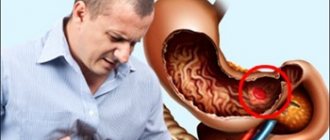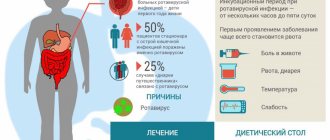Nausea
Nausea is a painful sensation of discomfort in the upper abdomen, esophagus and mouth; anticipation of vomiting. When describing such symptoms, patients say “I feel sick.” Sometimes the symptoms of nausea are less pronounced, in such cases they say “nauseous.” Nausea is often accompanied by weakness, sweating, and increased salivation. A person experiencing nausea may experience a decrease in blood pressure, become pale, and feel cold in the extremities.
Why do unpleasant symptoms occur?
Causes of nausea not related to illness include:
- Overeating and eating fatty foods . In this case, nausea appears after eating as a response of the body - it cannot cope with a “heavy” dish in terms of calories.
- Psychological factors. Constant stress, depression, and anxiety disrupt the overall metabolism in the body. Nausea occurs as soon as a person remembers an unpleasant experience or smells a familiar smell.
- Seasickness (motion sickness) . The receptors of the vestibular apparatus are irritated, a feeling of nausea occurs, which may be accompanied by vomiting.
- Pregnancy. Nausea and dizziness are observed in the first and second trimester of pregnancy. The sensation may progress to vomiting, but relief occurs on its own as the body adapts to pregnancy and the baby grows in the womb.
- In women, an unpleasant symptom often occurs during the premenstrual period.
- Impact of third party factors. An acute feeling of nausea can occur due to exposure to chemicals, medications, overheating, increased body temperature and other reasons.
Constant nausea often indicates the presence of various diseases. In some cases, depending on the stage of development of the disease, the feeling may occur periodically. He is called:
- Diseases that require urgent surgical intervention: appendicitis, acute pancreatitis, peritonitis of the gastrointestinal tract, intestinal obstruction.
- Chronic diseases associated with dysfunction of the gastrointestinal tract: peptic ulcer, cholecystitis, irritable bowel syndrome.
- Intestinal infections: enterovirus and rotavirus, cholecystitis, food poisoning.
- Liver diseases: hepatitis, cirrhosis.
- The presence of a foreign body in the abdomen (esophagus, intestines).
- Food allergies.
Severe headache and nausea can bother a person after traumatic brain injury, hypertension, diseases of the endocrine system, migraine, and after chemotherapy.
Development mechanism
The occurrence of nausea is based on the activation of the neural arc of the gag reflex at a level insufficient for the onset of vomiting. The most common trigger for a reflex reaction is irritation of peripheral receptors located in the digestive and a number of other organs. Less commonly, the reflex is activated due to stimulation of the vomiting center, the effect of toxic substances or metabolites on the receptive zone of the bottom of the fourth ventricle of the brain. In a number of conditions (for example, pregnancy), a combination of several triggering factors is possible.
Regardless of the reasons that provoked the development of nausea, the mechanism of its formation is based on a single pathophysiological process. When the vomiting center is activated, the tone of the muscular lining of the stomach decreases, its peristalsis slows down or completely stops. A simultaneous increase in the tone of the duodenum and the proximal part of the jejunum causes duodenogastric reflux. An increase in the volume of gastric chyme leads to reflex relaxation of the cardia, contraction of the antrum, diaphragm and intercostal muscles, which is perceived as a urge to vomit.
Clinical picture
Nausea, depending on the cause, may be accompanied by other symptoms.
- When eating fatty foods: abdominal pain, vomiting, weakness, drowsiness.
- Nausea is often observed in a child as a reaction of the body to an allergen. Adults and children equally experience: rash, redness, diarrhea, flatulence, runny nose, dry cough.
- In case of poisoning: flatulence, diarrhea, headaches, weakness.
In diseases, depending on the diagnosis, the manifestations differ:
- Diseases of the liver and gastrointestinal tract often resolve with vomiting, weakness, and body temperature rises to 39 degrees. There is a feeling of heaviness in the abdomen, diarrhea/constipation, and flatulence.
- Appendicitis will almost always be accompanied by acute pain in the lower abdomen and increased body temperature.
- With diseases of the cardiovascular system, nausea in the morning can turn into weakness in the afternoon, headaches, dizziness, and loss of consciousness.
Normally, in the absence of health problems, a person needs to eliminate the cause of the symptom. For example, exclude exposure to odors, consult a doctor about the need to take medications that calm the nervous system (if we are talking about psychological factors). Take a sorbent to remove toxins from the body in case of allergies or poisoning.
If, after treatment, pain, dizziness and nausea, as well as other accompanying symptoms, do not go away, you should urgently consult your doctor or gastroenterologist.
general characteristics
Patients characterize nausea as a painful sensation in the mouth, throat, along the esophagus, in the epigastrium, accompanied by a desire to induce vomiting or the urge to vomit.
In addition to discomfort in the gastrointestinal tract, there is often excessive secretion of saliva, an unusual taste in the mouth, coldness of the extremities, sweating, hyperhidrosis of the palms and feet. Characterized by weakness, dizziness, darkening of the eyes, unsteady gait. Compression may be felt in the epigastrium. From the outside, patients look confused, uncertain, pale, and sweaty. In some cases, a connection between nausea and food is revealed. In case of dietary errors, mild poisoning, and a number of gastroenterological diseases, the patient’s condition may improve spontaneously or after vomiting. Constant nausea lasting longer than two days is an indication for consultation with a gastroenterologist or therapist. The combination of nausea with thoracic, abdominal and headache, vomiting of blood or coffee-ground-colored masses, black tarry stools, hyperthermia over 38 ° C, convulsions, lack of urine, confusion is a sufficient reason to seek emergency medical help.
Treatment and diagnosis
If you are constantly bothered by nausea, a specialist will find out the causes of the symptom in several stages:
- Survey. Drawing up a detailed clinical picture allows the doctor to navigate further actions.
- Purpose of research. Depending on the circumstances under which the unpleasant feeling appeared, the doctor may prescribe: an ultrasound, a general blood test, a urine and stool test.
If the diagnostic results obtained show the absence of any diseases, the doctor will pay attention to the following points:
- whether a psychological disorder can be accompanied by nausea;
- whether relatives experienced similar symptoms;
- what foods the patient ate in the last 48 hours;
- How does this feeling affect the general condition of a person: do headaches and nausea occur along with it, are diarrhea, constipation, and flatulence bothering you.
First aid
In the absence of chronic and current diseases, the doctor will prescribe treatment aimed at restoring the body. First of all, the patient will be advised to:
- Establish an enhanced drinking regime.
- Take anti-inflammatory and painkillers.
- In some cases, when it comes to severe forms of roto- or enterovirus, antibiotics are prescribed.
To remove toxins from the body, therapy may be accompanied by simultaneous intake of sorbents. The Sorbex series are safe enterosorbents that do not treat the disease, but can alleviate its symptoms and course. Their composition is based on granular activated carbon, which absorbs harmful substances and removes them from the body naturally. In the available line of products you can choose drugs for children and adults.
Which doctor treats nausea
Frequent exacerbations of nausea require consultation with a gastroenterologist. The doctor is available by appointment. Anyone can choose the day and time of the appointment on the website, or by calling.
To make an appointment with a doctor, choose any method:
- call the clinic +7 (495) 103-99-55,
- order a call back,
- leave a request for an appointment using a convenient form on the website:
IMPORTANT! Nausea only seems like a minor symptom that passes quickly and does not lead to serious consequences. This important signal from the body that alarming changes are occurring at some level of regulation should not be underestimated.
In order to understand the problem, determine the causes of the symptom and correctly eliminate the problem, contact our treatment and rehabilitation center and an experienced and qualified specialist! Our doctors guarantee an individual approach to each patient at reasonable prices. Make an appointment with our doctor and forget about worrying about nausea!
SIGN UP
Useful tips
If you are worried about nausea and vomiting, weakness, here are some useful recommendations that will help alleviate the condition:
- Abundant air flow - you can open a window or sit in front of a fan.
- Drinking fluids. Drink more water, it will also help prevent dehydration and speed up your metabolism.
- Compress. The feeling of nausea will go away if you apply a cold compress to the forehead and neck area.
- Do not lie down, the bitterness in your mouth and nausea will intensify - gastric juice may rise up the esophagus. This is why gastroenterologists do not advise “resting” after eating.
It is recommended to drink at least 1 glass of warm water every morning on an empty stomach. The liquid will “wake up” the gastrointestinal tract and normalize metabolism. Also follows:
- minimize the amount of “heavy” food in the diet;
- exclude carbonated drinks;
- take care of the cleanliness of products that do not require heat treatment (berries, vegetables, fruits).
As a sorbent for quick relief of abdominal pain, if nausea and vomiting occur due to poisoning and allergies, always have supplements in the form of Sorbex enterosorbent in your medicine cabinet.
SORBEX® Duo
SORBEX® Classic
SORBEX® Ultra
Medicines and dietary supplements of the Sorbex series (Sorbex, Sorbex Ultra, Sorbex DUO) are based on improved activated carbon. Thanks to modern production technologies, the sorption capacity of Sorbex® has been significantly increased, which ensures its high sorption ability to absorb toxins, bacteria and other harmful substances.
Sorbex capsules contain activated carbon in the form of granules, which ensures adsorption activity throughout the entire residence time of the sorbent in the gastrointestinal tract. The effectiveness of granular carbon almost does not decrease within 36-48 hours, which allows you to increase the intervals between doses of this drug and reduce the dose. For adults with chronic diseases caused by endogenous intoxications, it is recommended to take 2–6 capsules 3 times a day for 10–15 days. For children over 7 years old, take 1-3 capsules 3-4 times a day. The drug is administered orally with water at intervals of 1.5–2 hours before or after meals or medications.
SORBEX ULTRA is a dietary supplement in the form of capsules based on highly dispersed activated carbon with extremely high adsorption activity, therefore it is especially effective for acute poisoning. Adults are recommended to take 1 capsule 2-3 times a day.
SORBEX DUO is a dietary supplement for the comprehensive cleansing of toxins from the body, combining the unique properties of a hydrocarbon sorbent in the form of granules and milk thistle extract. Thanks to this composition, SORBEX DUO helps reduce the manifestations of intoxication, protects and restores liver function. Adults take 2-3 capsules 2-3 times a day. Children aged 7 years and older – 1 capsule 2-3 times a day before or 1-1.5 hours after meals. Duration of use from 3 to 15 days
It should be borne in mind that sometimes nausea may be the only early sign of serious illness, so this symptom should not be ignored and you should consult a doctor.
Attention! Self-medication can harm your health!








